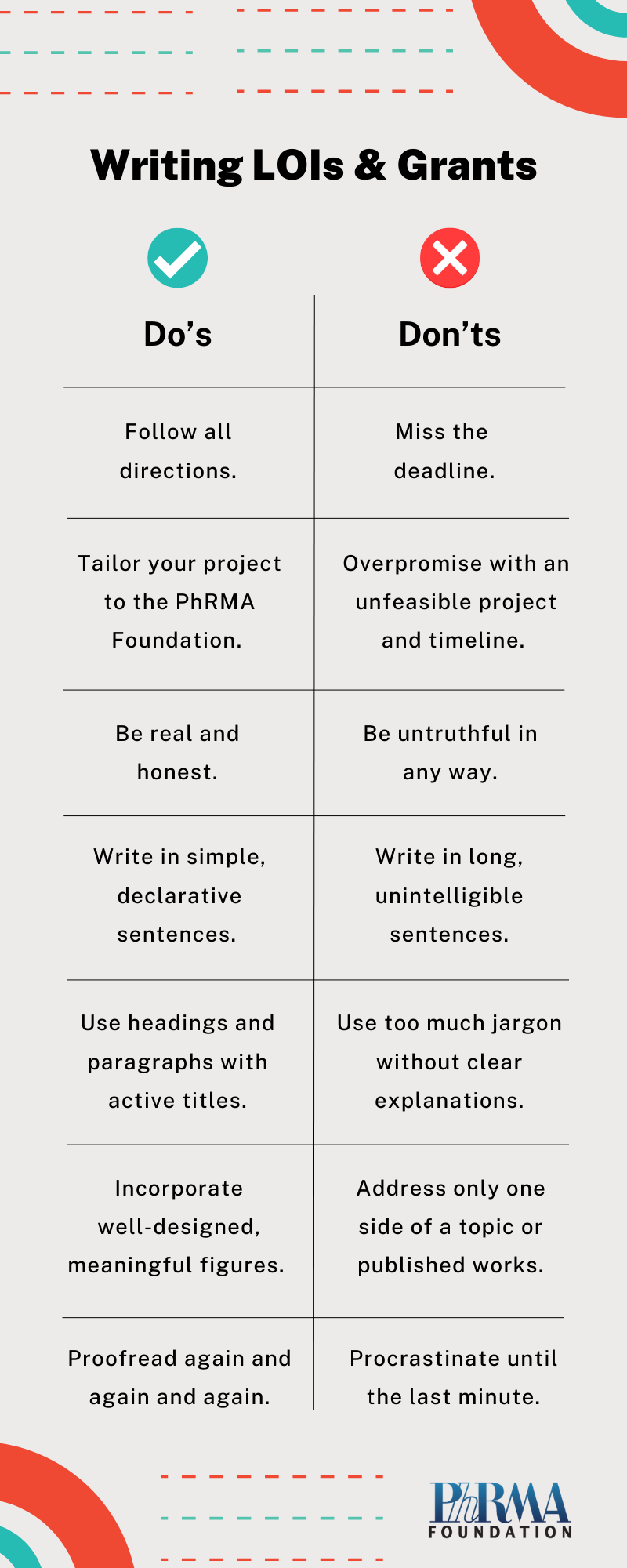Do’s and Don’ts for Writing a Standout LOI and Application
March 22, 2023Dr. Stephanie Watts shared her insight into writing a standout LOI and application, including some high-level do’s and don’ts of grant writing.
 The first grant application that Stephanie Watts ever wrote was for a PhRMA Foundation predoctoral fellowship. She didn’t get it.
The first grant application that Stephanie Watts ever wrote was for a PhRMA Foundation predoctoral fellowship. She didn’t get it.
“For as many successes as I’ve had, I’ve probably had four times that amount of failures. But one thing you don’t do is give up on a good idea,” said Watts, PhD, now a professor of pharmacology and toxicology at Michigan State University.
She applied to the PhRMA Foundation again, and this time, she succeeded. Since then, Watts has been a longtime supporter of the Foundation, serving for many years on its Scientific Advisory Committee, which reviews and scores letters of intent (LOI) and applications for Foundation fellowships and grants.
In a webinar this week, Watts shared her insight into writing a standout LOI and application, including some high-level do’s and don’ts of grant writing.
“Your goal is to be able to tell us a story and argue a project that makes it undeniable that the PhRMA Foundation is going to want to help you,” she said. “You want to capture my attention. I might have 10 grants to read in front of me. Yours is the one you want me to remember.”
Writing a Letter of Intent
To apply for a PhRMA Foundation Drug Discovery or Drug Delivery award is a two-step process. Applicants must submit an LOI, and those whose submissions are selected will be asked to complete a full application.
An LOI should distill the essence of your research project down to a compelling 600 words. When reading an LOI, Watts said she wants to know:
- Is the problem posed significant?
- Is the resolution of the problem novel?
- Is the project feasible with the time and resources?
- Will the final work product be concrete and impactful?
- Is the applicant well-suited to the project?
- Would support from a PhRMA Foundation grant help the applicant’s career path?
In addition to the 600-word LOI, the PhRMA Foundation also requires all applicants to answer four “Research Impact Questions” to help demonstrate that the applicant’s project fits with the PhRMA Foundation and that the project is innovative and will advance the field.
Applying for PhRMA Foundation Awards
Applicants who are invited to complete a full application must submit a more extensive research plan, an extended letter, and letters of support from mentors and references, among other items.
The extended letter gives applicants a chance to share in their own words about themselves and how the award would help them. “The people who review these awards want to know you,” Watts said. “This letter is a chance for you to shine and tell us about yourself. You have to be real. Don’t tell me what you think I want to hear.”
Letters from mentors are critical for researchers applying for predoctoral and postdoctoral fellowships, Watts said. “We need to know that you are in a safe space for being able to do the work you need,” she said. For Faculty Starter Grants, Watts stressed the importance of a letter from a department chair that demonstrates institutional commitment to helping the new faculty member get their research program off the ground.
Watts advised applicants to start working on their LOIs and applications with plenty of time for revisions and lots of proofreading. She encouraged applicants to read their proposals out loud to themselves as well as ask colleagues to provide feedback.
If an applicant isn’t funded the first time they apply to the Foundation, they can try again — just as Watts did. “Every time you write an application, you’re going to get better, so don’t ever think of it as a loss or a worthless exercise. It’s not,” Watts said.
Read the infographic below for more tips and watch the full webinar.


